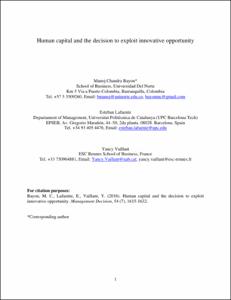Mostra el registre d'ítem simple
Human capital and the decision to exploit innovative opportunity
| dc.contributor.author | Bayon, Manoj |
| dc.contributor.author | Lafuente González, Esteban Miguel |
| dc.contributor.author | Vaillant, Yancy |
| dc.contributor.other | Universitat Politècnica de Catalunya. Departament d'Organització d'Empreses |
| dc.date.accessioned | 2016-09-20T08:44:25Z |
| dc.date.available | 2016-09-20T08:44:25Z |
| dc.date.issued | 2016 |
| dc.identifier.citation | Bayon, M., Lafuente, E., Vaillant, Y. Human capital and the decision to exploit innovative opportunity. "Management decision", 2016, vol. 54, núm. 7, p. 1615-1632. |
| dc.identifier.issn | 0025-1747 |
| dc.identifier.uri | http://hdl.handle.net/2117/90061 |
| dc.description.abstract | Purpose: The purpose of this paper is to examine the direct and interaction effect of individuals’ human capital input and human capital output in the form of entrepreneurial self-confidence on the decision to exploit innovative opportunities. Design/methodology/approach: Using a strategic entrepreneurship perspective, the authors suggest that when individuals with high human capital decide to exploit opportunities they do so by thinking and acting strategically. Strategic action(s) involves pursuing competitive advantages that enable a new venture to get a foothold in the market. The authors argue that such competitive advantages arise from the exploitation of innovative opportunities and individuals with high human capital are more likely to exploit innovative opportunities when they develop entrepreneurial self-confidence. The empirical analysis is based on a random sample of individuals from the adult population who are in the process of creating a new venture. Findings: The results suggest that although human capital inputs and human capital output in the form of entrepreneurial self-confidence are significant factors in influencing the decision to exploit innovative opportunities, human capital inputs interact in different ways with human capital output in influencing this decision. Research limitations/implications: The main limitation of the authors’ study is the use of single item measures as indicators of innovative opportunity and human capital output (entrepreneurial self-confidence). Practical implications: From a macro-perspective, the main implication of the study is that it is possible to assess the quality of entrepreneurship in an economy through individuals’ human capital and the proportion of innovative opportunities in the economy. Moreover, because not all types of human capital inputs influences the exploitation of innovative opportunities, policy makers can be selective in their policy interventions in spawning quality entrepreneurship in their economy. Originality/value: Based on population-level data the authors’ study provides empirical evidence of the nature of entrepreneurial decisions being at the earliest phases of the entrepreneurial process. The study shows the importance of founders’ human capital inputs and outputs in influencing the quality of entrepreneurship in an economy. Moreover, the study extends the understanding the individual-opportunity nexus in promoting innovative entrepreneurship in an economy. |
| dc.format.extent | 18 p. |
| dc.language.iso | eng |
| dc.rights.uri | http://creativecommons.org/licenses/by-nc-nd/3.0/es/ |
| dc.subject | Àrees temàtiques de la UPC::Economia i organització d'empreses::Gestió del coneixement |
| dc.subject.lcsh | Knowledge management |
| dc.subject.other | Competitive advantage |
| dc.subject.other | strategic actions |
| dc.subject.other | entrepreneurial self-confidence |
| dc.subject.other | human capital input |
| dc.subject.other | human capital output |
| dc.subject.other | innovative opportunities |
| dc.title | Human capital and the decision to exploit innovative opportunity |
| dc.type | Article |
| dc.subject.lemac | Gestió del coneixement |
| dc.identifier.doi | 10.1108/MD-04-2015-0130 |
| dc.description.peerreviewed | Peer Reviewed |
| dc.rights.access | Open Access |
| local.identifier.drac | 18815459 |
| dc.description.version | Postprint (author's final draft) |
| local.citation.author | Bayon, M.; Lafuente, E.; Vaillant, Y. |
| local.citation.publicationName | Management decision |
| local.citation.volume | 54 |
| local.citation.number | 7 |
| local.citation.startingPage | 1615 |
| local.citation.endingPage | 1632 |
Fitxers d'aquest items
Aquest ítem apareix a les col·leccions següents
-
Articles de revista [841]


